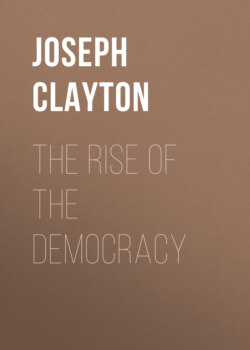The Rise of the Democracy

Реклама. ООО «ЛитРес», ИНН: 7719571260.
Оглавление
Joseph Clayton. The Rise of the Democracy
The Rise of the Democracy
Table of Contents
PREFACE
the early struggles against the absolutism of the crown
the beginning of parliamentary representation
popular insurrection in england
the struggle renewed against the crown
constitutional government—aristocracy triumphant
the rise of the democratic idea
parliamentary reform and the enfranchisement of the people
democracy at work
the world-wide movement: its strength and weakness
LIST OF PLATES
THE RISE OF THE DEMOCRACY
INTRODUCTION
The British Influence
Government of the People, by the People, for the People
The Foundations of Democracy
British Democracy Experimental, not Doctrinaire
Education to Democracy
CHAPTER I
THE EARLY STRUGGLES AGAINST THE ABSOLUTISM OF THE CROWN
The Great Churchmen
Archbishop Anselm and Norman Autocracy
Thomas à Becket and Henry II
Stephen Langton and John
The Great Charter
MAGNA CHARTA. A facsimile of the Original in the British Museum
CHAPTER II
THE BEGINNING OF PARLIAMENTARY REPRESENTATION
Democracy and Representative Government
Representative Theory First Found in Ecclesiastical Assemblies
The Misrule of Henry III
Simon of Montfort, Leader of the National Party
Edward I.'s Model Parliament, 1295
The Nobility Predominant in Parliament
The Medieval National Assemblies
No Theory of Democracy in the Middle Ages
CHAPTER III
POPULAR INSURRECTION IN ENGLAND
General Results of Popular Risings
William FitzOsbert, called Longbeard, 1196
The Peasant Revolt and its Leaders, 1381
Jack Cade, Captain of Kent, 1450
The Norfolk Rising under Robert Ket, 1549
CHAPTER IV
THE STRUGGLE RENEWED AGAINST THE CROWN
Parliament under the Tudors
SIR JOHN ELIOT
Victory of Parliament over the Stuarts
The Democratic Protest—Lilburne
Winstanley and "The Diggers"
JOHN HAMPDEN
The Restoration
CHAPTER V
CONSTITUTIONAL GOVERNMENT—ARISTOCRACY TRIUMPHANT
Government by Aristocracy
Civil and Religious Liberty
Growth of Cabinet Rule
Walpole's Rule
The Change in the House of Lords
"Wilkes and Liberty"
CHAPTER VI
THE RISE OF THE DEMOCRATIC IDEA
The Witness of the Middle Ages
The "Social Contract" Theory
Thomas Hobbes (1588–1679)
John Locke (1632–1704)
Rousseau and the French Revolution
American Independence
Thomas Paine (1737–1809)
Major Cartwright and the "Radical Reformers"
THE GORDON RIOTS
Thomas Spence (1750–1814)
Practical Politics and Democratic Ideals
CHAPTER VII
PARLIAMENTARY REFORM AND THE ENFRANCHISEMENT OF THE PEOPLE
The Industrial Revolution
The Need for Parliamentary Reform
Manufacturing Centres Unrepresented in Parliament
The Passage of the Great Reform Bill
The Working Class Still Unrepresented
Chartism
The Hyde Park Railings (1866)
Household Suffrage
Working-Class Representation in Parliament
Removal of Religious Disabilities—Catholics, Jews, and Freethinkers
The Enfranchisement of Women
CHAPTER VIII
DEMOCRACY AT WORK
Local Government
THE RIGHT HON. JOHN BURNS, M.P
The Workman in the House of Commons
Working-class Leaders in Parliament
THE RIGHT HON. D. LLOYD GEORGE, M.P
The Present Position of the House of Lords
THE PASSING OF THE PARLIAMENT BILL IN THE HOUSE OF LORDS
The Popularity of the Crown
The Democratic Ideals: Socialism and Social Reform
Land Reform and the Single Tax
CHAPTER IX
THE WORLD-WIDE MOVEMENT: ITS STRENGTH AND WEAKNESS
East and West
Tyranny under Democratic Forms
The Obvious Dangers
Party Government
Bureaucracy
Working-Class Ascendancy
On Behalf of Democracy
Notes
Отрывок из книги
Joseph Clayton
Published by Good Press, 2019
.....
But the guilds, with their numerous almshouses and hospitals, were all suppressed early in Edward VI.'s reign, and their funds confiscated. As for the parish, it was shorn of all its property, save the parish church, in the same reign, and its old self-governing life dwindled away to the election of churchwardens.
It was not till the beginning of the nineteenth century that the working classes, by the formation of trade unions, once more took up the task of education in self-government. From that time onward, through trade unions, co-operative societies, and friendly societies, with their annual conferences and congresses, a steady training in democracy has been achieved; and our Labour Party of to-day, with its Members of Parliament, its members of county and district councils, and its Justices of the Peace, would hardly have been possible but for this training. Other agencies may be mentioned. The temperance movement, the organisation of working-men's clubs, and the local preaching of the Nonconformist Churches—particularly the Primitive Methodist denomination—have all helped to educate workmen in the conduct of affairs, and to create that sense of personal responsibility which is the only guarantee of an honest democracy.
.....